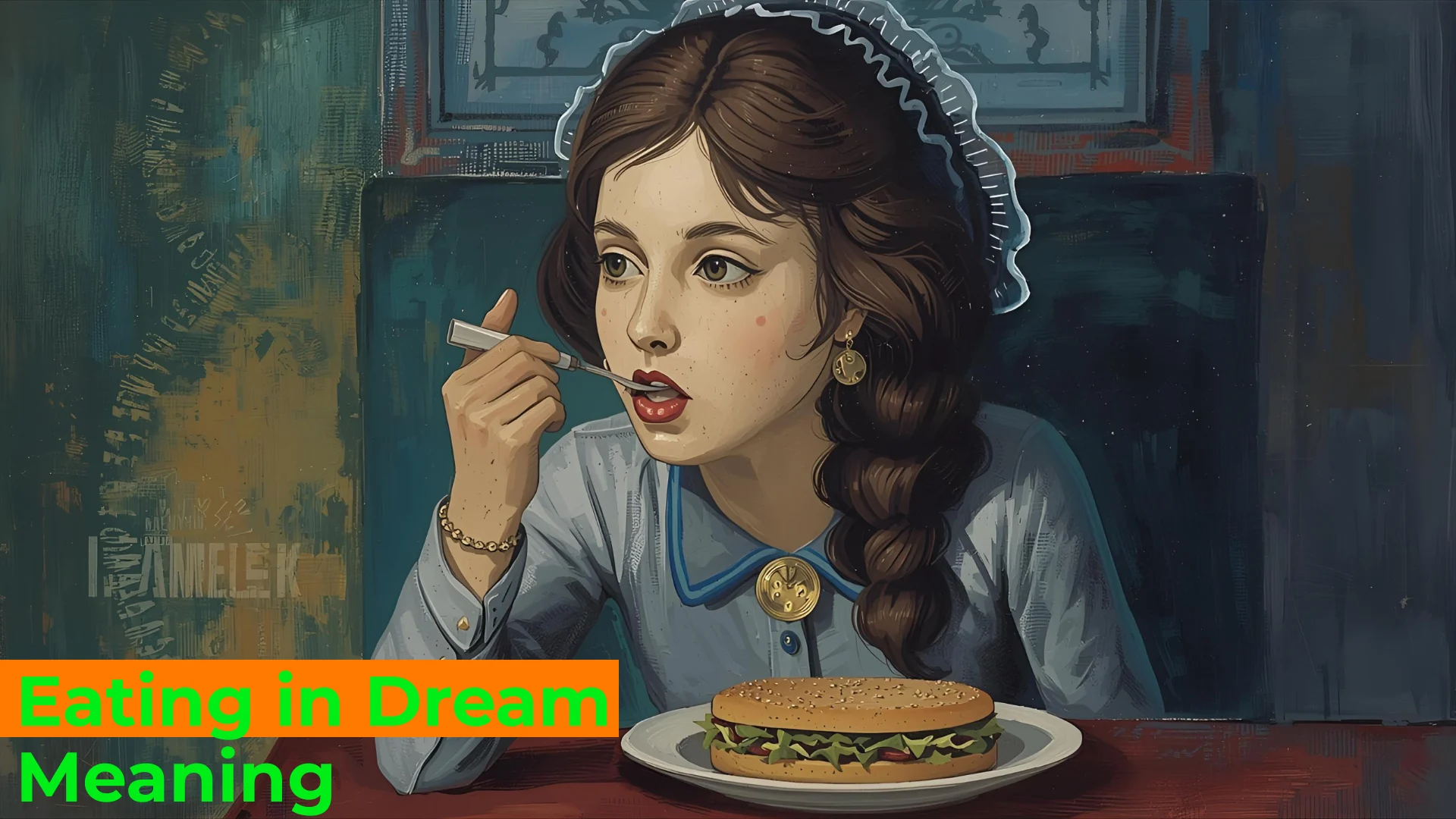Have you ever woken up with the memory of eating in a dream? Maybe you were enjoying your favorite meal, tasting flavors so vivid they lingered after waking. Or perhaps you were eating something strange, even unsettling. Dreams about eating can be comforting, bizarre, or even deeply symbolic.
In many cultures, eating in dreams represents more than just food—it symbolizes nourishment of the soul, hunger for knowledge, healing of inner wounds, and even spiritual communion. Just as food sustains the body, dream-food often points to what sustains the heart, mind, and spirit.
Throughout history, humans have linked eating in dreams to emotions, desires, health, and spiritual growth. Sometimes, it signals an unmet need—physical or emotional. Other times, it represents abundance, satisfaction, or the act of “digesting” life’s experiences.
This article will take you on a journey into the meaning of eating in dreams, exploring it through historical, psychological, spiritual, symbolic, and cultural lenses. By the end, you’ll discover how these dream-meals may carry hidden messages tailored just for you.
🏺 Historical & Anthropological Background
Dreams have fascinated humanity for millennia. Ancient civilizations often treated dreams as messages from the divine.
- Ancient Egypt: Egyptians believed that dreaming of food meant divine blessings. Bread and beer, staples of their diet, represented life and eternity.
- Greek & Roman Traditions: In classical texts, eating in dreams symbolized desires, cravings, and the body’s needs. Priests of Asclepius, the god of healing, even used dream-food visions for diagnosing illnesses.
- Chinese Traditions: Ancient Chinese dream dictionaries connected eating with wealth, fertility, and prosperity. Eating sweet fruits often indicated joy, while bitter foods suggested sorrow.
- Indigenous Cultures: Among Native American tribes, dream-food could represent a vision quest—guiding the dreamer toward strength, survival, or ancestral wisdom.
Anthropologically, dreams about eating often mirror survival instincts. For early humans, food was scarce and sacred. To dream of eating was to dream of survival, abundance, and divine care.
🧠 Psychological & Healing Interpretations
Modern psychology also offers rich interpretations for eating dreams.
Jungian Perspective
Carl Jung suggested that food in dreams symbolizes psychological nourishment. Just as the body digests meals, the psyche “digests” experiences, knowledge, and emotions. Dream-food may represent:
- A desire to integrate new wisdom.
- Hunger for love, attention, or spiritual truth.
- Inner healing through acceptance and growth.
Freudian Perspective
Sigmund Freud linked eating dreams to desire and gratification. For Freud, food represented primal needs, often linked to unconscious sexual or emotional cravings.
Healing Psychology
- Eating healthy food in dreams may symbolize healing, self-care, or recovery.
- Eating spoiled or rotten food could reflect toxic relationships, negative thoughts, or unprocessed trauma.
- Eating excessively may point to emotional emptiness or lack of control in waking life.
In modern therapy, dream analysis is often used to uncover hidden stressors. If food appears in your dreams, your subconscious may be telling you to pay attention to what truly “feeds” you—emotionally, mentally, and spiritually.
🙏 Spiritual & Religious Perspectives
Eating in dreams often carries deep spiritual meaning.
- Christianity: Sharing a meal symbolizes communion, unity, and divine blessing. Dream-eating could represent receiving spiritual nourishment from God.
- Islam: In Islamic dream interpretation, eating good food indicates prosperity, blessings, or increased knowledge, while bad food suggests trials.
- Hinduism: Food is sacred (Prasad), and eating in dreams may mean divine grace or karmic cleansing.
- Native American Spirituality: Eating in dreams often symbolizes communion with ancestors or guidance from spirit animals.
In many faiths, food is sacred because it sustains life. Dreaming of eating may remind the dreamer that the soul, like the body, needs constant nourishment through prayer, meditation, love, and wisdom.
🌱 Deeper Symbolism of Eating in Dreams
Beyond psychology and spirituality, eating in dreams reflects universal human themes:
- Strength & Resilience: Eating may symbolize energy and power to face challenges.
- Healing: Just as food heals the body, dream-food may heal the spirit.
- Protection: Eating protective foods (like garlic or herbs) in dreams may suggest spiritual shielding.
- Transformation: Consuming something strange may symbolize embracing change or “digesting” new experiences.
- Connection: Sharing food in a dream may reflect harmony, bonding, or a longing for togetherness.
⚖️ Gender-Based Meanings
Dream interpretations sometimes differ by gender:
- For Men: Eating in dreams may symbolize ambition, desire for success, or physical vitality. A feast could represent wealth, while spoiled food may hint at wasted opportunities.
- For Women: Eating may symbolize emotional nourishment, fertility, or caregiving energy. It could also reveal how she feels about nurturing others vs. herself.
In essence, gender-based interpretations highlight how food in dreams connects with masculine drive and feminine nurturing, though both energies exist in every person.
📍 Placement & Body Location Meanings
Interestingly, some traditions interpret eating dreams in connection with body locations or sensations.
- Eating with hands: Suggests primal instincts, independence, or cultural roots.
- Eating from the chest (heart area): Symbolizes emotional fulfillment or love.
- Eating from the head (dream imagery): Represents intellectual hunger or thirst for knowledge.
- Eating from the stomach: Suggests grounding, survival, and material needs.
Dreams often blur physical boundaries, but these symbolic “placements” show which part of the self is seeking nourishment.
🎨 Design & Color Symbolism of Food in Dreams
Just as in art and spirituality, colors in food dreams carry symbolic weight:
- Red (meat, fruit): Passion, energy, desire.
- Blue (berries, drinks): Peace, calm, spiritual wisdom.
- Green (vegetables): Healing, growth, renewal.
- Yellow (bread, grains): Happiness, abundance, creativity.
- White (milk, rice): Purity, innocence, blessings.
- Black (burnt food): Fear, loss, or negative energy.
Food design also matters:
- Feast: Abundance, joy, community.
- Single food item: Focus on one need or lesson.
- Exotic/strange food: New opportunities, risks, or challenges.
🔥 Cultural Debate: Respect vs. Appropriation
Food symbolism is sacred in many cultures. Some anthropologists warn against oversimplifying or misusing dream interpretations.
- Respect: Many indigenous traditions view food dreams as visions of guidance. Outsiders should approach these interpretations with humility and respect.
- Appropriation Risk: Commercializing or distorting cultural dream meanings can dishonor their origins.
- Balance: Learning from diverse traditions is enriching, but acknowledging their roots is essential.
📖 Real-Life Stories & Examples
- A young woman dreaming of eating fruit: She later realized it symbolized fertility and soon discovered she was pregnant.
- A man dreaming of eating spoiled bread: He was struggling with a toxic work environment, and the dream mirrored his “bad nourishment” from stress.
- A spiritual seeker eating honey in a dream: This was interpreted as divine blessing, as honey often symbolizes wisdom and sweetness of life.
These stories remind us that dreams are deeply personal—what nourishes one person may poison another. Context is everything.
❓ FAQs About Eating in Dreams
1. Is eating in dreams a good or bad sign?
It depends—healthy, sweet, or abundant food often means blessings. Rotten or bitter food may suggest struggles or toxic influences.
2. Why do I dream of eating strange foods?
This may symbolize new experiences, risks, or fears you’re “digesting” in life.
3. Can eating in dreams mean spiritual growth?
Yes. Many traditions see it as receiving divine wisdom or soul nourishment.
4. What if I can’t taste the food in my dream?
Lack of taste may suggest emotional numbness, unfulfilled desires, or detachment.
5. Is dreaming of overeating significant?
Yes, it may indicate overindulgence, emotional emptiness, or stress.
🌟 Conclusion: What Your Dream Meal Means
Dreams of eating are not random—they are symbolic feasts of the soul. Whether they point to hunger for love, spiritual nourishment, or hidden fears, they invite us to reflect deeply on what truly sustains us.
Next time you wake up remembering a dream meal, ask yourself:
- What was I eating?
- How did it taste?
- Who was with me?
- How did I feel?
Your answers may reveal profound insights about your inner world. Remember—dreams are mirrors of the subconscious, and food in dreams is often the medicine of the spirit.


